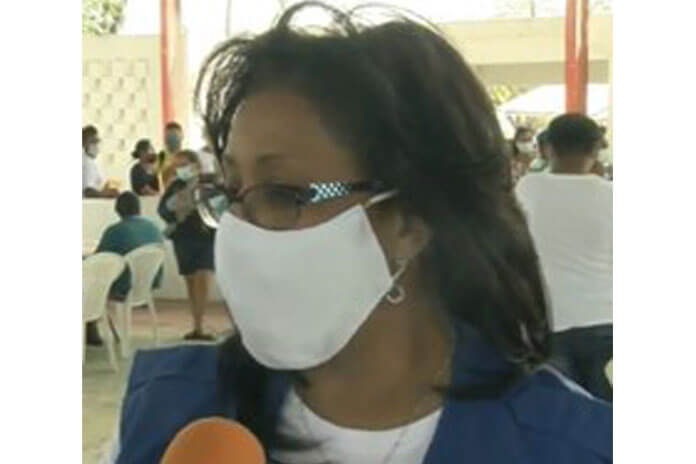ORANGE WALK, Mon. Mar. 28, 2022– This April, Belize’s third ever amnesty program, through which permanent residency will be granted to undocumented migrants and registered asylum seekers living in the country, will finally be launched, and in preparation for that launch the International Office for Migration Belize (IOM Belize) has set up a two-day mobile hub in the Orange Walk District, where they will be assisting qualified persons in preparing to apply for the program. According to Miss Diana Locke, the Head of Office at IOM Belize, the mobile hub is a “one stop shop” that provides all the necessary services that will help to make the application process smoother in April. Those services include compilation of necessary documents, translation, statutory declaration writing, and even assistance in completing the amnesty program’s application form.
Orange Walk is the second stop on the mobile hub’s tour, with Corozal having been the first. Speaking with local media, Diana Locke shared that IOM is planning on offering the mobile services countrywide for as long as their funding permits.
On day one of the two-day stop in Orange Walk, Prime Minister John Briceño and Minister of State in the Ministry of Foreign Affairs, Foreign Trade, and Immigration, Hon. Ramon Cervantes, were in attendance. The Prime Minister was given a tour of the facility, and he then spoke briefly with local media, whom he told that he expects anywhere between 30,000 and 40,000 persons to apply for the amnesty program. He also spoke on the importance of the program, which has not been conducted since 1999.
“Well, what happened is that when we were first in government in 1999, we saw the need to be able to have all of these people that are living ‘in the shadows,’ as we would say—they are not part of the formal system. And we felt that it was important to get them to become legal in the country. And once they become legal in the country, it makes it so much easier for them to be able to get a social security, for them to open a bank account, to be able to work, and also to stop the exploitation, because a lot of unscrupulous business people would take advantage of them because they don’t have their papers,” he said.
The Briceño administration first announced its amnesty program for 2022 back in December of 2021, noting that the program seeks to embrace the key principles of the UN’s Sustainable Development Goals. The significant increase in migration, both legal and illegal, across the globe and especially in the Americas has been attributed to civil unrest as well as lack of employment opportunities in countries throughout the region. When it comes to Central American and CARICOM countries, many migrants have been fleeing from violence, whether gang-related or political, or leaving their homes in search of a better quality of life. Many of the persons being granted amnesty are persons who have already been working in—and contributing to—the country. By becoming documented, the chances of these migrants being taken advantage of—in the form of human trafficking or poor working conditions, for example—are lessened.
“Fast forward to today, now twenty two years later, we’re finding out that we’re in the same situation as we were before. So the Minister of Immigration, Minister Courtenay and his Deputy Minister Ramon Cervantes came to Cabinet and said, ‘you know, we’re facing this issue’,” stated the Prime Minister.
Once the amnesty program is over, however, the Government is planning on tightening immigration policies—which is why IOM’s Diana Locke is hoping that as many persons as possible take advantage of the program when it is launched in April. Her advice to those who wish to apply but aren’t sure how is simple: reach out.
“If you need to, don’t be afraid—go into the Immigration office and ask them questions. Reach out to people in the community, people that you know. The area representatives have been very active in terms of assisting people so they can go to their offices and ask for help,” she said.
Apart from visiting IOM’s mobile hub, those wishing to seek assistance in completing the application process for this year’s program can visit any of their countrywide hubs, including the YWCA in Belize City, the Child Development Foundation in Belmopan, the Red Cross Office in San Ignacio and Humana People to People Belize in Bella Vista.

